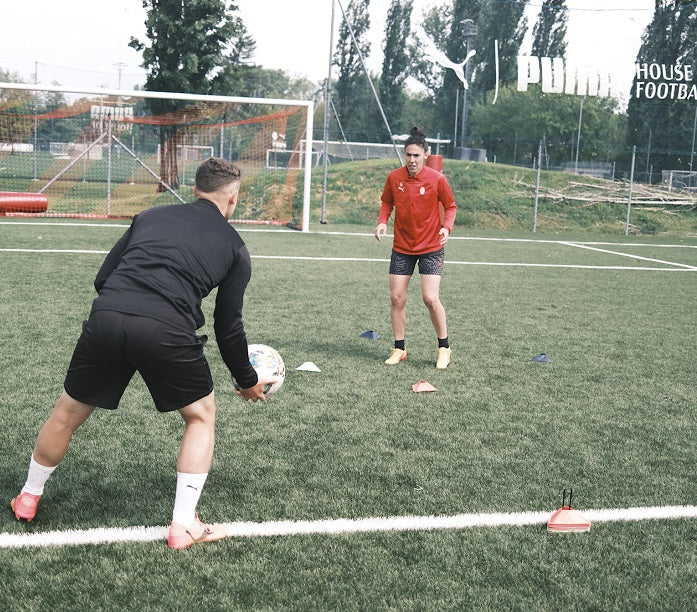Introduction
Football is a popular sport around the world that is played according to a clearly defined set of rules. These rules ensure fairness and structure in the game and are set by FIFA and the International Football Association Board (IFAB) . This article provides a comprehensive overview of the most important rules in football. The target group are young and adult football enthusiasts in Switzerland.
The playing field
dimensions and markings
The playing field is rectangular and must comply with the official dimensions: length 90-120 meters and width 45-90 meters. The most important markings on the playing field are the center line, the center circle, the penalty areas, the goal area and the corner areas.
goals
The goals consist of two vertical posts and a horizontal crossbar that form a rectangle. The goal line is the line between the posts that the ball must completely cross to score a goal.
start and playing time
kick-off
The game begins with a kick-off from the centre of the pitch. The kick-off is also taken after a goal and at the start of the second half. All players must be in their own half of the pitch and opposing players must be at least 9.15 metres from the ball.
playing time
A football match lasts 90 minutes and is divided into two halves of 45 minutes each. The half-time break is 15 minutes. In knockout matches, there may be extra time of two 15-minute periods and possibly a penalty shoot-out.
goals and game outcome
scoring a goal
A goal is scored when the ball crosses the goal line entirely between the posts and under the crossbar without any infringement of the rules. The winner of the match is the team that scores the most goals.
draw and extra time
If the match is tied after regular time, extra time may be played in knockout matches. If the match remains tied after extra time, a penalty shootout will decide the winner.
players and substitutions
number of players
A team consists of eleven players, including a goalkeeper. A game cannot start if a team has fewer than seven players.
substitutions
Three substitutions are usually allowed during a match. In some competitions, including Euro 2024, five substitutions per team are permitted to reduce the strain on the players.
rule violations and sanctions
fouls and unsportsmanlike conduct
Fouls and unsportsmanlike conduct are punished by the referee. The most common violations include dangerous play, holding, pushing and deliberate handball. The penalties for such violations range from free kicks to yellow and red cards and even penalties.
handball rule
Intentional handball is punished with a free kick or penalty kick. Handball occurs when a player intentionally plays the ball with his hand or arm in order to gain an advantage.
offside rule
A player is offside when he is in the opponent's half of the field and is closer to the goal line than the ball and the second-to-last defender, unless he is in his own half of the field. Offside is only penalized when the player actively interferes with the play.
standard situations
free kick
A free kick is awarded after a foul or infringement of the rules. There are direct and indirect free kicks. A direct free kick allows you to shoot directly at the goal and score a goal, while with an indirect free kick the ball must be touched by another player before a goal can be scored.
Corner
A corner kick is awarded when the ball crosses the goal line and was last touched by a player of the defending team. The corner kick is taken into the field of play from the corner flag.
penalty kick
A penalty kick is awarded when a foul or handball is committed in the penalty area. The penalty kick is taken from the penalty mark directly at goal and only the goalkeeper may attempt to save the ball.
referees and assistants
duties of the referee
The referee is responsible for enforcing the rules and directing the game. He makes decisions on rule violations, issues penalties and monitors playing time.
assistants
The referee's assistants help him monitor the game, especially in assessing offsides and throw-ins. In modern competitions, the Video Assistant Referee (VAR) is also used to correct clear wrong decisions.
Current adjustments to the 2024 European Championship
handball rule
The handball rule has been clarified at the 2024 European Championships to create clarity. An unintentional touch of the ball with the hand by an attacker that directly leads to a goal is no longer considered an offence.
offside rule
Discussions about adapting the offside rule have resulted in the current rule being retained. However, suggestions have been made to relax the rule in the future to benefit attackers.
player substitution
At the 2024 European Championship, five substitutions per team are allowed to reduce the strain on the players. This rule has proven successful in recent years and is expected to be retained.
goal-line technology
Goal-line technology will continue to be used to ensure that all goals are correctly detected. This technology is crucial in close match situations and has proven to be a reliable tool.
Conclusion
The Laws of Football ensure fairness and order in the game and are regularly updated to meet the demands of modern football. Euro 2024 has introduced some specific adjustments and technologies to improve decision-making processes. A comprehensive understanding of these laws is crucial for players, coaches and fans to fully enjoy the game and understand the decisions of the referees.



